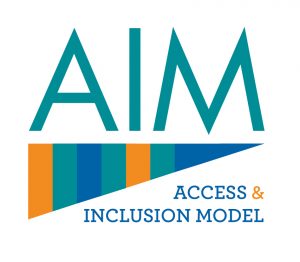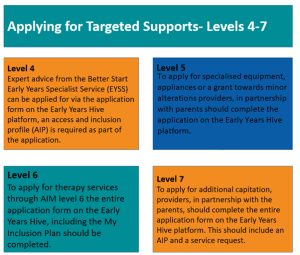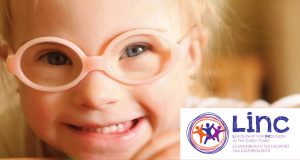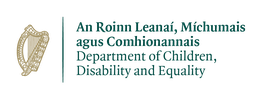 The Access and Inclusion Model – AIM
The Access and Inclusion Model – AIM
The goal of AIM is to create a more inclusive environment in pre-schools, so all children, regardless of ability, can benefit from quality early learning and care. The model achieves this by providing universal supports to pre-school settings, and targeted supports, which focus on the needs of the individual child, without requiring a diagnosis of disability.
AIM commenced in 2016, since then, it has helped tens of thousands of children with a disability to access and meaningfully participate in the ECCE programme in pre-school settings nationwide. The model has been recognised internationally and has won awards for both excellence in practice, and inclusive policy.
All pre-school providers and staff should be familiar with the AIM Policy & Rules. Pre-school services that avail of AIM are obliged to comply with these rules. They are a useful resource for both parents and for the early learning and care sector.
Universal Design Guidelines can be found here: Universal Design Guidelines – Access and Inclusion Model
AIM Level 7 Compliance
- AIM Level 7 Checklist for Providers 2024-25
- AIM Level 7 Compliance Guide for Providers 2024-25
- AIM Level 7 Post Inspection Rectification Actions for Providers 2024-25
AIM Supports
AIM Targeted Supports cater to a wide range of abilities and are focused on the needs of the child and do not need a diagnosis of disability.
AIM Universal Supports benefit the whole pre-school environment through empowering pre-school providers to create a more inclusive culture in their settings.
How to Apply – The Application Process
 When starting the application process, it is important to carefully read the application form and ensure that both parent and provider consent to the application for AIM supports. You should consider the following: what supports are required? is the child eligible for AIM support? is the child moving pre-school? or currently in receipt of AIM supports?
When starting the application process, it is important to carefully read the application form and ensure that both parent and provider consent to the application for AIM supports. You should consider the following: what supports are required? is the child eligible for AIM support? is the child moving pre-school? or currently in receipt of AIM supports?
Once all information is to hand, the provider will submit an application form to Pobal through the Early Years Hive Platform in collaboration with the parent.
If a pre-school provider requires support submitting an AIM application, they can raise a request via the Early Years Hive. Alternatively, you can contact the Early Years Provider Centre (EYPC) Monday to Friday 9am to 5pm (10am to 5pm on Wednesday) at 01 511 7222. A pre-school provider or parent who has not applied for AIM level 4 can raise a request via the Early Years Hive or call the Early Years Provider Centre and request a call back from an Early Years Specialist in relation to the application process also. The EYSS can provide advice on the appropriate supports for a child, transitions to primary school and assist with any stage of the targeted supports application process.
After submission, Pobal will review the application and notify the provider and parent of the outcome. Applicants can accept, reject or request more information on the application. A rejection can be appealed by the parent or the provider through the Early Years Hive also. All application queries can be made to Pobal – (onlinesupport@pobal.ie / 01 5117222).
AIM Expansion with Services
Please see the questions asked over the recent training sessions. The responses below have been provided by the subject matter experts (SME’s) on this topic. The responses have
been divided based on the programme type. AIM Expansion with Services
AIM Inclusive Play
AIM Inclusive Play was introduced in 2018 as a set of sensory and educational play resources to support inclusive practice within Early Learning and Care settings. The AIM Inclusive Play (AIP) pack was supplied to over 4,000 Early Learning and Care settings in 2018. These resources included equipment, toys and materials to support the development of coordination and audio, visual and tactile skills among all children, and in particular, children with a disability.
The resources were carefully chosen with the help of Learning SPACE (Specialised Products Aiding Child Education) to support all children, regardless of ability, within the learning environment. Items from the AIP packs and other resources can be purchased from Learning SPACE at www.learningspaceuk.co.uk.
AIM Inclusive Play reinforces an important message – that children’s play is a vital ingredient of childhood, essential for both growth and learning and an integral element of high quality pre-school provision. Read on for more information on AIM Inclusive play.
 LINC – Leadership for INClusion in the Early Years programme
LINC – Leadership for INClusion in the Early Years programme
The Leadership for INClusion in the Early Years programme is designed to support the inclusion of all children in the early years. The course is offered for free to people working within Early Learning and Care and is fully funded. Once qualified, graduates will perform the role of Inclusion Coordinator within their Early Learning and Care Setting.
The development of the programme is part of a government response to local, national and international demands for high quality education and training leading towards graduate pathways in the combined field of early childhood care and education (ECCE). The programme seeks to address the need for continuing professional development (CPD) in relation to the inclusion of all children.
LINC – Programme Structure
The LINC+ CPD Programme is only open to graduates of the LINC Level 6 Programme and consists of six 10 hour continuing professional development packages. All six packages are now available. The first Package, Communities of Practice, must be completed by all participants. Following completion of Package 1, Communities of Practice, participants can then choose whichever package they wish to engage with. The LINC+ CPD Programme is delivered 100% online. Flexible learning is at the heart of LINC+ CPD and participants can engage with the programme content at a time that suits their own schedule.
More information on the LINC+ CPD Programme can be found here.
| Module Title (credits) | Semester | Module Outline |
| Inclusion in Early Years Settings: Concepts and Strategies (12 ECTS) | Autumn | View Here |
| Child Development (6 ECTS) | Autumn | View Here |
| Promoting Collaborative Practice for Inclusion in Early Childhood Care and Education (12 ECTS) | Autumn/Spring | View Here |
| Curriculum for Inclusion (6 ECTS) | Spring | View Here |
| Leadership for Inclusion (12 ECTS) | Spring | View Here |
| Portfolio Module (12 ECTS) | Autumn/Spring | View Here |
Please note, additional information is now required when submitting an AIM Level 7 Plus and/or Non-term application for the 2025/2026 programme call. New questions have been added under the ‘Session ratio questions’ section of the application to capture the required information. Please find a breakdown of the additional questions below.
Additional questions
‘What are the current number of core adults in the session this child is attending (excluding AIM additional assistance and this proposed additional assistance)? Please enter the number of core adults only who will be in the session that this child will be attending.
‘Are there additional staff not funded by Pobal/Better Start? Please note any staff that are HSE-funded or employed under a community employment scheme cannot be included in the ratio.’ If any additional staff members will be in the session that this child will be attending, please select ‘Yes’. Please note, AIM additional assistance staff are funded by Pobal/ Better Start, therefore should not be included in your response to this question. If you select ‘Yes’, please advise ‘How many?’ additional staff members will be in the session not funded by Pobal.
‘Are there additional staff currently funded by Pobal (level 7 support) in this session?’. Please answer ‘Yes’ if there is an AIM additional assistance staff member who is currently funded by Pobal in this session. If you answer ‘Yes’, please specify how many AIM additional assistance staff are in this session (do not include this application or any other pending applications, only include staff already approved/funded). Please, do not include staff funded by other programmes as these are captured in question 2.
‘What are the current number of registered children in the session this child is attending?’ Please advise on the number of registered children in this session, e.g. if there are 22 children registered to attend the session, please note this in your response.
‘Is there more than one child who has a submitted AIM Plus and/or AIM Standard application attending this session?’ or ‘Is there more than one child who has a submitted AIM Non-term application attending this session?’ Please answer ‘Yes’ if another child in this session has submitted an AIM Level 7 application. For this question, please do not include any child(ren) who already have an approved/funded application; these must be included in question 3. This question is only for submitted but not yet appraised applications. If you answer ‘Yes,’ a follow-up question will appear; please specify ‘How many children in total (including current application)?’. Your answer to the follow-up question should include the child for whom you are submitting the current application.


